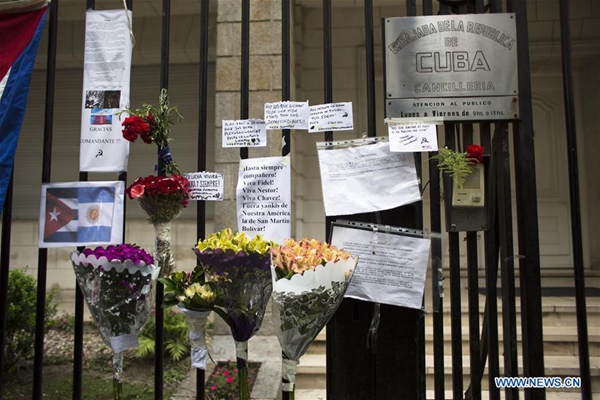The immortal Fidel Castro
china.org.cn / chinagate.cn by Sajjad Malik, November 29, 2016 Adjust font size:
|
|
|
Flowers and notes are placed by residents in front of the Cuban Embassy after the death of Cuban revolutionary leader Fidel Castro, in Buenos Aires, Argentina, on Nov. 26, 2016. Aged 90, Castro passed away late Friday night. (Xinhua/Martin Zabala) |
Fidel Castro is dead. In his own words he was never afraid of death. That helped him to survive at least 638 attempts on his life. He was one of the most hunted people with no closed season for his enemies looking for his head. But they failed; Fidel won.
He defied the most powerful country just 90 miles away. The CIA, notorious for plotting overthrows, could not reach the Cuban man. He ruled for 49 years - a sort of record for a non-royal - after building a communist state through a successful revolution in 1959.
Famous for oratory and puffing Cuban cigars, which were banned in the U.S., he lived an unusually long life, saying good-bye at 90. The death was announced by Rahul Castro on state television. The mortal remains would be cremated and the ashes buried. But his political struggle and life will never be forgotten. Rather, his ideals and struggle will inspire new discussions.
He had said that history would "absolve" him, meaning that he would be remembered in good words. History is cruel because it always tells the truth. So, it is too early to say if history will absolve Fidel. Men like him are not easy to be adjudged. May be after a couple of decades, it would be possible to see his actions in its true light. But no doubt, he is already an icon. The history of Latin America would never be complete without him.
If one word can define Fidel Castro, it is "defiance." He was a symbol of resistance, who against heavy odds fought to overthrow an absolute ruler. Surviving despite opposition by the United States, which used every third rated method to remove him. But Fidel defied the American power and hegemony.
He embraced communism and built a system based on a Marxist-Leninist model where poor people could have free access to health and education. There was no going back on evolutionary ideas. Even after countries like Yugoslavia, USSR and the entire Eastern Block disintegrated and renounced communism, he stood his ground.
Years earlier, when China introduced market reforms and started a journey to build a powerful economy, the Cuban leader was not impressed and stuck to his own way of government and economic system.
It is clear that he could not succeed the way he would have liked. The chief reason was the mighty next door neighbor. His government was constantly threatened by the U.S. The confrontation sapped a lot of energy and consumed a lot of time and resources. Finally, it was the U.S. that blinked when Barack Obama decided to undo the flawed politics of the Cold War and established diplomatic ties with Havana.
It is not easy to sum up the legacy of Fidel Castro. Putting trust in your own powers and making sustained efforts to reach the desired goal is just one way to define the powerful legacy of the man who is still revered and hated with nearly equal amounts of passions. It was visible after his death, when people on the street of Cuba were crying and those living in Miami in exile were celebrating.
He was a true champion of the poor workers, peasants and those not blessed with material resources. His emphasis on free health and education helped millions who could never dream of quality healthcare or to send their kids to schools. His reforms in the two sectors will be long remembered.
Fidel was also the voice of the Third World - the unfortunate symbol of poverty and backwardness. He would never miss an opportunity to highlight the issues faced by Third World countries. The poor in Cuba and elsewhere have lost the most ardent living supporter for their rights.
He did not have success on the economic front. But he cannot be entirely blamed for it. The particular global economic order clashed with his ideals and since he was not ready to forgo his principles, he and the Cuba had to pay a heavy economic price.
Of course, treatment of dissidents and political opponents is a question mark. But it is difficult to say how much of the opposition was genuine or sponsored. The fact that he survived coups and life attempts while always freely roaming around and meeting the people proves his solid support base and that people liked him.
And don't forget his speeches delivered in revolutionary zeal, which are history now. Some of them might last for up to seven hours. He also holds the record for the longest speech at the UN: a four-hour and 29-minute address in 1960 got him in the Guinness Book of Records.
Sajjad Malik is a columnist with China.org.cn. For more information please visit:
http://www.china.org.cn/opinion/SajjadMalik.htm
Opinion articles reflect the views of their authors, not necessarily those of China.org.cn.
